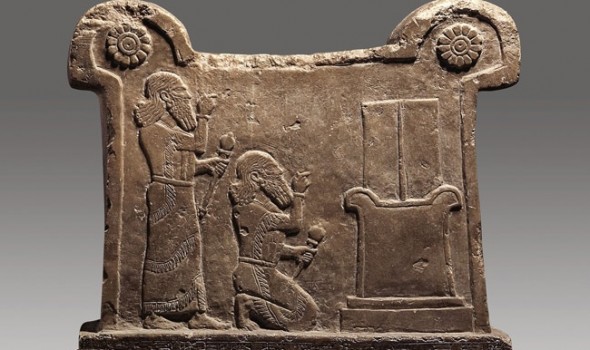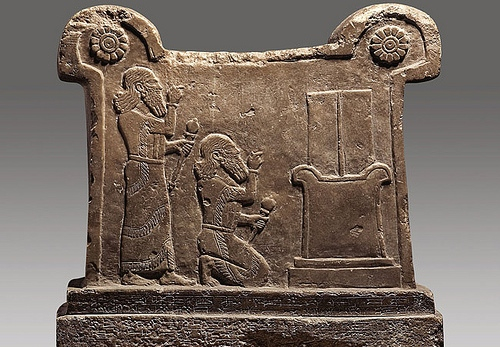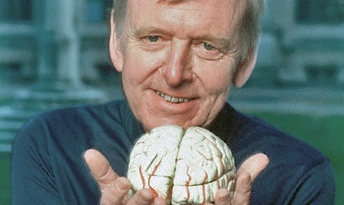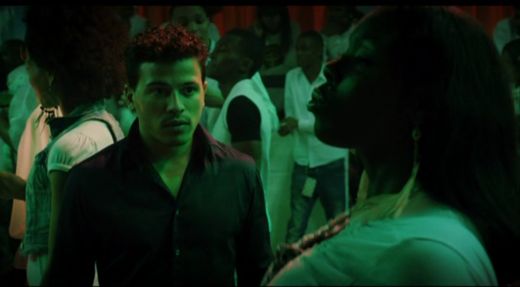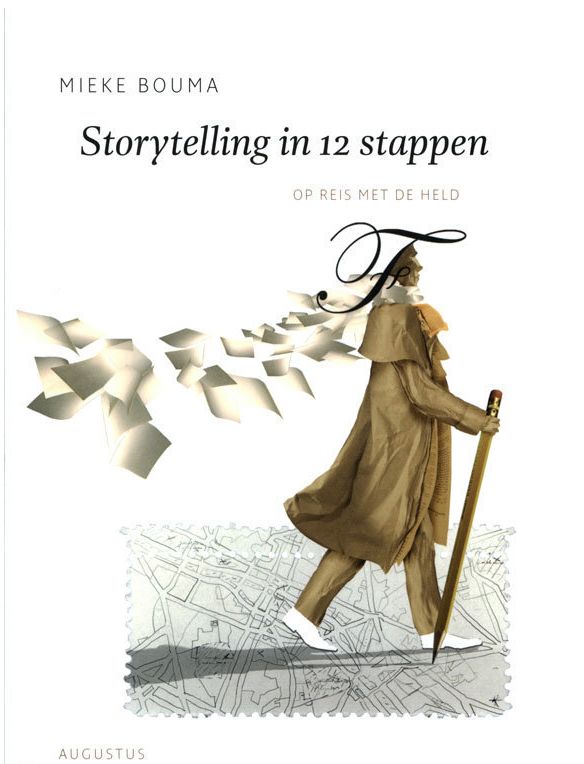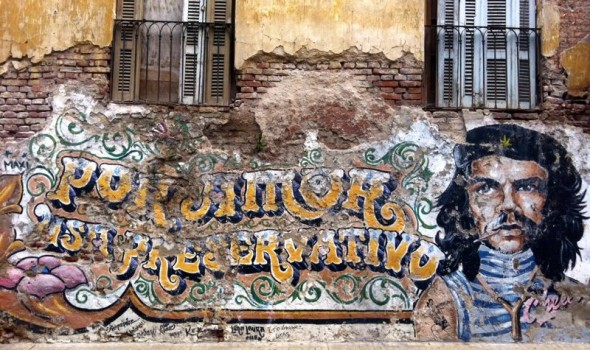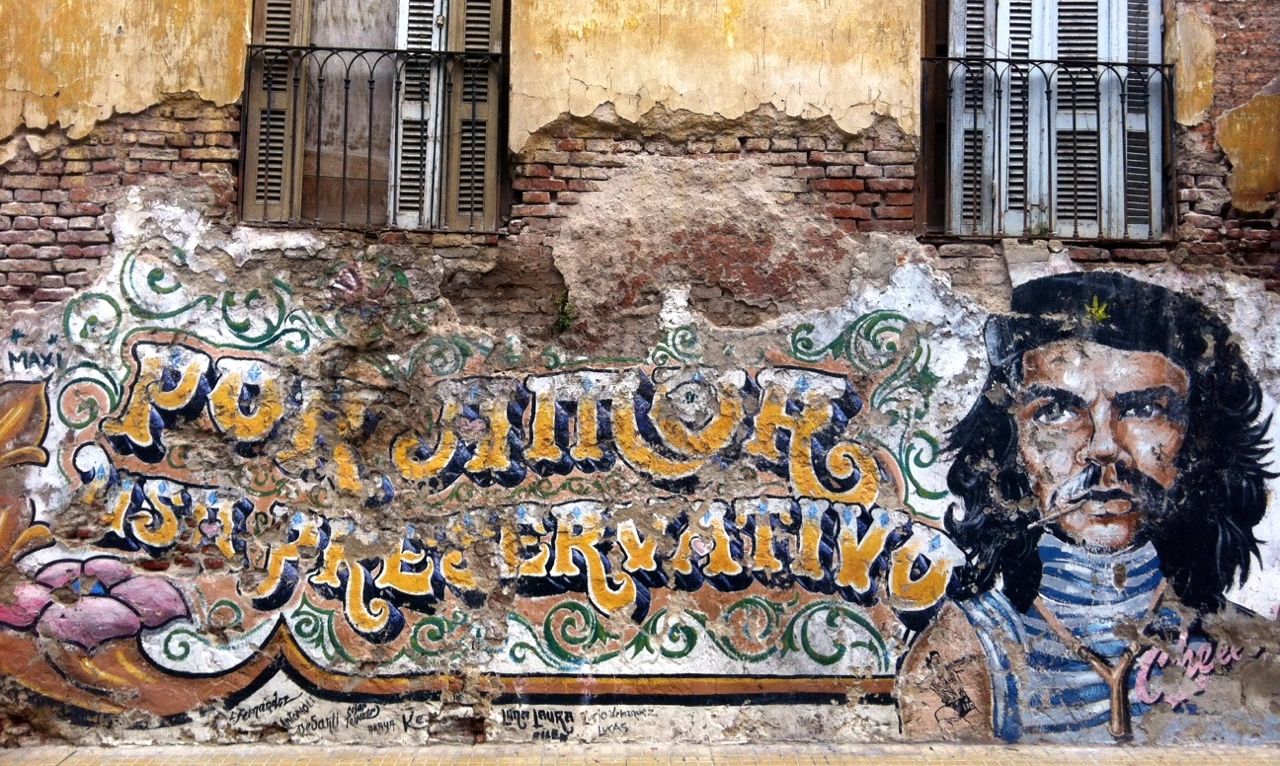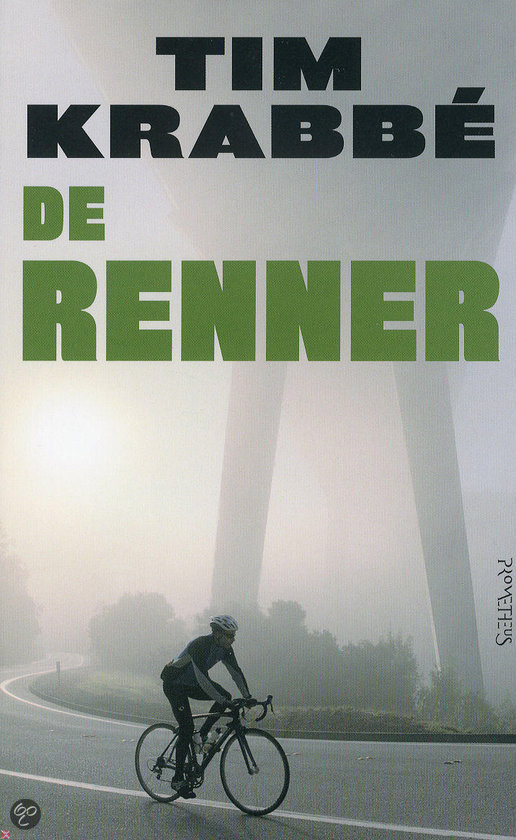I always thought that the invention of fire and the wheel were the most important breakthroughs in the history of mankind. After reading The Origin of consciousness in the breakdown of the bicameral mind (Julian Jaynes, 1976) I wonder if conceptual innovations were not at least as revolutionary. Jaynes makes us realize that mental abilities that we take for granted are in fact hard-won achievements.
Brain gymnastics
Understanding The Origin requires quite a bit of brain gymnastics. I remember reading for an hour and a humble eight pages or so, feeling excited but exhausted and having to put the book aside. I would not believe someone who says to have read the entire book within a few days – and claiming to have understood it. It takes time to process the concepts and the new perspective they give on all kinds of familiar phenomena.
Jaynes begins by analyzing subjective consciousness in all its parts. What would remain if we would subtract all these items from our bag of mental tricks – would we still call what remains consciousness? Jaynes asks us, for example, the following. Imagine a culture in which people do not view the future as ahead of them, like we do, and neither as something that they fall into backwards (like the old Greek are said to have pictured it in a certain era). Instead, imagine that in this culture there is no way to visualise time in either direction. In other words: a way of thinking in which time cannot be imagined in a spatial way. Which implications would this have for the psychology of the those people? As Jaynes argues, a lot depends on this apparently simple trick.
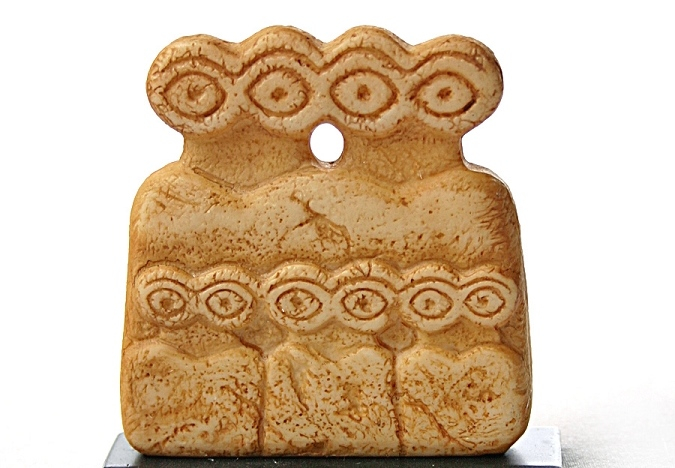
Idols from Mesopotamia
And so the demolition continues (read the quotes or the summary for a more in-depth account), until finally we can more or less imagine a mentality that differs so radically from our own that it is indeed questionable if we would be right to call it consciousness. Once Jaynes has ‘broken down’ our own subjective consciousness, he then proceeds in the opposite direction, as a kind of ‘reverse mind engineer’. He demonstrates how humankind invented, in the course of centuries, a self and an I which can move in a metaphorical space.
Jaynes makes us understand that for the people with a pre-conscious mentality, the ‘gods’, so curious from our perspective, served the purpose of both propelling and explaining behavior. Propelling behavior, because they were the voices telling people how to act on certain occasions. Explaining behavior, because they were entities that explained behavior in a kind of proto-mentalistic vocabulary. A vocabulary which lacked concepts such as consideration, choice, memory – let alone the concept of free will.
The tricky business of evolutionary psychology
Evolutionary psychology consists, broadly speaking, of two methods. Method one, the modern approach, is to perform experiments – literally in the psychological laboratory – after the workings of modern human mind. On the basis of what is found there – the talents, the twists, the apparent anachronisms – something is deduced from the psychological environment in which the human mind evolved. Method two is the classical philology: the analysis of word use in ancient texts.
Julian Jaynes uses both methods to reach his spectacular conclusion. And he attaches much value to the textual method two:
‘Let no one say that these are just word changes. Word changes are concept changes and concept changes are behavioral changes.’
The strongest chapters are those in which he traces the evolution of the meaning of words that were the predecessors of our current mentalistic vocabulary – most notably chapter 5 of the second book: The Intellectual Consciousness of Greece.
Can we learn from textual sources about the way people thought in a certain time? Jaynes’ main posit – the fast evolution of human consciousness between 1000 and 500 B.C. – rests on this assumption. But one could object: how can we be sure that the writers of the Iliad were faithful to reality? Wasn’t it a stylistic ‘matter of speaking’ to attribute the cause of human action to the gods? Jaynes rejects this option, and I agree with him on this issue. He convincingly explains that the difference between Iliad and Odyssey, between Biblical Amos and Ecclesiastes, is not merely a difference in language. The characters in these stories move in essentially different psychological worlds, in which they perform radically different acts. ‘Word changes […] are behavioral changes.’ (This approach also comes across clearly in Metaphors we live by by Lakoff and Johnson. The metaphors that we use to describe our everyday actions even determine these actions. For example: a culture which incorporates the metaphors ‘time is money’, operates in a different way from a culture in which this metaphor does not exist. This is not merely a matter of putting the same process in different words. Instead, the words create the difference.)
The less crucial chapters, which are even more speculative, are the method-one chapters. Especially Chapter 5 of Book 1, The Double Brain, in which Jaynes relates the anatomy of our brain to the structure of the bicameral mind. Indeed, it is a nice coincidence that our brain has two sides and that the bimameral mind is also dual in nature. But the question if the latter can be reduced to the first might be not so crucial after all. Suppose that future research would arrive at radically different insights about the organisation of our brains – not our minds. I feel that this would still leave Jaynes’s central position concerning the organisation of our minds unaffected. After all, we are dealing here with mind and metaphor, with ‘software’, not with the hardware of the brain.
Another speculative argument, gathered both from ancient texts and present-day psychology, is that the voices which are still heard today by schizophrenics are remnants of the old bicameral mind. According to Jaynes, this aspect of hallucination was crucial to the inner voices. But still I am inclined to say: would it really matter if the voices were hallucinated or ‘simply’ heard? Wouldn’t this be a ‘difference in volume’, and not a functional difference (Dennett proposed, during an early conference on the book, the alternative that the voices might have had the character of ‘jingles’: repetitive fragments of music and speech). Jaynes would probably object that this does imply a functional difference, because the absolute authority of the voices could only be attained by the force of hallucination.
Like every author who proposes a revolutionary theory, Jaynes can’t resist putting a huge amount of circumstantial evidence on the table. The entire third part/book can be read as such: Vestiges of the bicameral mind in the modern world. The ‘necker cube has flipped’ and a lot of psychological phenomena must now be put in the new perspective. Although his examples are inspiring and pretty convincing, Jaynes has made himself vulnerable. Because it may seem to some readers that if one of the pillars of his theory would be removed, the entire building would collapse. However, I consider his theory foremost as a collection of mutually reinforcing hypotheses, none of which is crucial.
Three obstacles to understanding
There are a few obstacles that need to be cleared before one can accept Jaynes’s central argument. Put very briefly, this argument goes as follows:
‘In a distant past, people had no subjective consciousness, that is to say no elaborate concept of self. Instead, they heard voices that told them how to solve dilemma’s according to social norms. Subjective consciousness as we know it only came into being after a period of social chaos, which forced people to invent new concepts to deal with this changed environment – and thereby creating a new environment. The new subjective consciousness that emerged is basically a collection of metaphors.’
Put this briefly, this train of thought is hard to follow. That is why I want to remove three main obstacles along the way. First, the voices. What on earth are we to make of those? Secondly, the relation between structure of society and the individual minds therein. And finally, the relation between language, metaphor and mind. The story of Odysseus will nicely unite these three problems and their understanding.
1. The voices
So what about these voices of the gods? Is Jaynes making supernatural claims about the minds of ancient mankind, as some naive readers have understood it? Not at all. From one perspective, there is nothing strange about people hearing and obeying voices. I also hear ‘a voice in my head’, but I experience it (fortunately) as coming from ‘me’, as an ‘internal’ monologue or dialogue. And although the voice in me does not have the force of a hallucination, I still don’t have that much control over it. What I do have is the ability to direct it a little bit and to confront it. I can frame it; it is embedded in a mental organisation in which it can have an antagonist voice. My voice has all kinds of tools and a lot more ‘space to move’, which makes it more flexible than the bicameral mechanism of ‘voice-speaks-I-obey’.
A second difference, of course, between my voice and bicameral voices is that the latter are hallucinated. I must admit that although Jaynes defends his case in a good way, I still find it hard to accept that hallucinations were a normal part of mental life of past millennia – at least on occasions: people were not hallucinating all the time. Somehow, a change of ‘cold’ concepts is easier for me to accept than the ‘high temperature’ with which trains of thought were supposedly experienced in this past.
2. Society and mind
Let alone the problem with the voices, many people will understandably just not buy the idea that mankind without consciousness was capable of all the great accomplishments it achieved: the invention of agriculture, pyramids, etcetera. But remember how much intelligent behavior we conscious beings are capable of without using conscious thought. Conscious thought is only required at certain occasions. Which brings me to the second point. I find it plausible that, in relatively simple and predictable social environments, consciousness is actually not that crucial in everyday life. I am reminded of a Dutch documentary in which an old, old-fashioned farmer is asked by his son: ‘but father, what is your personal opinion on this matter?’ After a long silence, father responds: ‘What do you mean, personal opinion?’ (This charming piece of dialogue is quoted in historian Geert Mak’s book Jorwerd: the death of the village in late twentieth-century Europe, which original Dutch title translates literally as – very appropriate in this context – How God left Jorwerd.) I quote it here to stress that any person who is embedded, as this farmer is, in a stable, highly cyclical social and economical environment, may not need a lot of introspective conscious thought to function normally.
I am not claiming anything as drastic that this farmer is ‘not conscious’. But compare his mind to the mind of a lone, nomadic person. Any person who is drifting and is insecure of what the next day will bring, has to represent the world and his place therein in different and probably more advanced ways than people in highly organized and predictable societies. This shift towards higher complexity and individuality is what happened to mankind as a whole in the course of millennia.
3. Metaphor, mind and the story of Odysseus
The relation between society and mind brings me to Odysseus. This unbound and lawless hero had to get by without the stability of a social structure. According to Jaynes, the transition from one mentality to another began in a period of social chaos, in which humankind was torn from its old social equilibrium. That is why the figure of the lone Odysseus, this ‘hero of the new mentality of how to get along in a ruined and god-weakened world’, is pivotal. Not just in the Origin, but in the history of mankind. Jaynes points at an eery coincidence, namely that the Odyssey, which for Jaynes serves primarily as a source of evidence on the level of word usage and word meaning, is on a topical level about the very same matter that the Origin is about! The theme of the Odyssey is the journey of its hero towards a new identity. This long journey involves testings, deceit, disguises and recognition. These are concepts that are mostly unheard of in older writings such as the Iliad. So the emerging theme of the Odyssey is the discovery of a new self, the adventures of a mind that is no longer a puppet of a god.
Is this thematic similarity between the Odyssey and the Origin a weird coincidence? Not if one accepts Jaynes’s profound idea of what the Odyssey meant to people in those days. First, he reminds us that epics like the Odyssey were primarily orally transmitted by travelling poets (aoidoi), who in times of social chaos travelled from refugee camp to refugee camp. Next, he stresses that these chanted poems were to the audience much more than mere entertainment: ‘Poems are rafts clutched at by men drowning in inadequate minds.’ In other words, these poems provided people with new ways of thinking about themselves, at a time at which the old bicameral ways of thinking were no longer useful.
So the Odyssey has even more historical significance than we thought it had. The above implies that besides being a beautiful metaphorical account of a historical process – mankind’s discovery of a new mentality – the adventures of Odysseus are the discovery of the new mentality! Jaynes claims that (a poem like) the Odyssey, in oral form, was the vehicle that helped establishing and spreading a new way of thinking. It was a collection of active ‘memes’. Returning to the opening question of this paragraph: on second thoughts it makes perfect sense that the first text in which these new concepts of consciousness are to be found, is not about, let’s say, interior decoration, but about the discovery of consciousness itself.
It amounts to this: mankind invented consciousness by telling itself a story about a loner who discovered consciousness. That is how the story of Odysseus has the fascinating property of being at the same time a metaphor for an invention and the invention itself. This can be so because in this case the invention is metaphor. The 0dyssey, this new story, these new concepts, these new metaphors, constitute a new ‘space’ that allows a new kind of human mind to inhabit it. In my view, Jaynes’s treatment of Odysseus unites many crucial elements of his main argument. It teaches us something about the relation between psychology and society, about lost authority and finding a new voice, and about the relation between metaphor and mind. Jaynes:
From a will-less gigolo of a divinity to the gore-spattered lion on his own hearth, Odysseus becomes ‘Odysseus’ (p.277)
Controversy, neglect and praise
Almost fourty years after its publication, the dust still hasn’t settled. In many academic debates, the name Jaynes pops up, always good for a stir in the discussion. The book gets more and more credits for its pioneering role. There is a growing sense of acknowledgment that it has, at the very least, created an new and serious topic for discussion. In the words of an early reviewer:
‘even as the skeptic marshals arguments against Jaynes’s theory, ‘he has to think about matters he never thought of before, or, if he has thought of them, he must think about them in contexts and relationships that are strikingly new’ (Hilgard quoted in Gliedman, Julian Jaynes and the ancient mindgods).
Still, for such a controversial book, it is remarkable how few scholars have made an attempt at an in-depth discussion, either favorable or unfavorable. A clever mind like Richard Dawkins, in The God Delusion, still does not know what to make of it: ‘either complete rubbish or a work of consummate genius, nothing in between! Probably the former, but I am hedging my bets.’ Pascal Boyer, in his thought-provoking book Religion Explained, does not even mention Jaynes, and neither do a lot of handbooks of consciousness or evolutionary psychology! Why all this hesitation? Marcel Kuijsten, editor of the recent book on the topic, Reflections on the dawn of consciousness, Julian Jaynes’s bicameral mind theory revisited, blames this on two things. First, the apparent outrageousness of the theory, which not every respected academic would risk his reputation on. And second: the expertise that is required to encompass a broad spectrum of academic disciplines, ranging from neuroscience to Old-Greek literature.
I would add another problem: the fact that some of the arguments are impossible to falsify or affirm. Consider the sequence of events that Jaynes pictures when he ponders on the prehistorical evolution of the bicameral mind, namely as a means of internalizing social control for a group of hominid hunter/gatherers. This bold and tantalizing sort of speculation has no or very little backup of any historical evidence. It is ‘reverse engineering’, it is idealized history, in big chunks and with giant leaps. It depends very much on one’s taste and intuitions if one becomes convinced. Personally, I find myself exhilirated, but I guess many scientists are simply allergic to this type of reasoning. Daniel Dennett, however, as one of the early advocates of the book, has the following opinion:
If we are going to use this top-down approach, we are going to have to be bold. We are going to have to be speculative, but there is good and bad speculation, and this is not an unparalleled activity in science. […] Those scientists who have no taste for this sort of speculative enterprise will just have to stay in the trenches and do without it, while the rest of us risk embarrassing mistakes and have a lot of fun.
The Origin and its intellectual kin
How does the Origin relate to other publications of the era? Apart from is pioneering role, it is not in all respects a revolutionary book. As an exponent of the cognitive revolution in psychology, it is clearly akin to the spirit of the age. It rejects behavioristic approaches of psychology and favors the view that we must not be afraid of mentalistic terms. Or compare the Origin to the aforementioned Metaphors we live by (Lakoff & Johnson, 1980), which also stresses the importance of metaphor in language. The crucial link is that metaphors itself can be the invention. Interestingly, the Origin was published in the same year as Dawkins’s pioneering The Selfish Gene, which introduced the concept of the meme. I wonder if and when Jaynes read Dawkins, but he probably would have liked the implications that the concept of the meme has for human psychology as an evolutionary process.
An interesting question is how Jaynes’s work relates to the research field that emerged in the nineties: Embodied Embedded Cognition (EEC). That is the idea that much of our behaviour does not merely result from ‘computation’ in our brain, but takes shape as an interplay between brain, body and world. So this movement is somewhat of a counter-revolution against the cognitive revolution that I see Jaynes part of. But remember that it was Jaynes who reminded us that there was a phase in our history in which an even larger part of our mental behavior was ‘embedded’ in the external world. To make a decision was in this stage an external process more than it is now: it was to peek in the intestines of animals, to watch the stars, and things like that (note that this was the period after the collapse of the bicameral mind). A large part of this behavior has since been internalised via metaphor. I suppose that Jaynes, despite his frequent use of ‘internalisation’, would agree with the advocates of EEC that it is an interesting question to which degree our thinking still takes place in the external world.
Conclusion
The merit of Jaynes is that he lets us think about consciousness in a new way. It is by sketching an alternative mentality that our view of ourselves suddenly becomes ‘three-dimensional’. It does not really matter if his sketch of the bicameral mind is right to the level of detail – how could it be, considering the scarce evidence? The merit is that the new perspective is created at all.
Two important things have become clear to me since reading The Origin. First: consciousness depends very much on language and the concepts that a language has at its disposal. To put it in a different way: one could imagine a grammatically fully developed language that still would not produce consciousness in the minds of the people who speak it. And second: how relative is the truth of our own mentalistic jargon! Aren’t our current words for mental processes almost as fictional as the good old gods? That bunch of metaphorical expressions, these ‘loanwords’ we use to denominate ‘processes in our heads’?
I must admit that I had often goose bumps while reading. Jaynes is a lyrical writer on the occasions he wants to convey the overwhelming scope of his subject matter. The final paragraphs on Odysseus are an example of his lyrical style. He deals with evolutionary psychology in the most spectacular of historical contexts. This deserves more than a reserved, scientific writing style. And so Jaynes’s words radiate a palpable awe of his subject.
The main character in Jaynes’s story is mankind itself, in its succession of mental stages through many millennia. Mankind, which lost its gods and had to figure things out on its own. Poor mankind, which invented all kinds of tricks to discover the intention of its lost gods: throwing sticks, poking in the intestines of animals… Mankind, which began so bravely with its first attempts at introspection. And which was so clever to use its existing vocabulary as source of metaphors to invent a new, inner territory. But also: a mankind that is doomed to carry on forever without divine support…
This is a history of Biblical proportion. I think that Jaynes is not exaggerating when he draws the parallel with the Genesis story of man’s Fall. Indeed it is fascinating that even the Bible mentions a watershed in human history. It is the parable of Adam and Eve who eat from the tree of knowledge (self knowledge?) and who from that moment on can no longer be in direct contact with their God. I would not go so far as calling this passage proof of Jaynes’s theory, but it got me thinking again about the relationship between god and humankind. It is nowadays common to consider God an invention of the human mind: we are supposed to have invented God, killed God, and now God is dead – at least to some of us. But Jaynes reverses the historical order: ‘The voices which had to be obeyed were the absolute prerequisite to the conscious stage of mind in which it is the self that is responsible and can debate within itself.’ So in a very real sense, ‘God’ or ‘the gods’ or ‘the voices’ came first and ‘we’ came later. That is if we mean by ‘we’ a humankind that has subjective consciousness. I am glad that for the first time I seem to be able to put in perspective this Biblical order of things, which had always been incomprehensible to me.
Goodbye gods, goodbye unassailable authority. Nevermore the comfort of voices that tell us what to do. So that is our unfortunate fate, but also our grandeur. I have never read a book on evolutionary psychology of such a deep significance.

